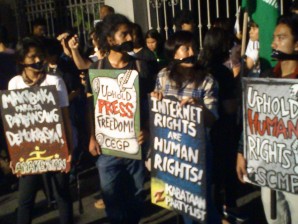
Students, bloggers troop to the Supreme Court on the eve of the oral argument on the petition against the Cybercrime law. INQUIRER.net/Tetch Torres
MANILA, Philippines—A day before the face-off between the government and the anti-Cybercrime law advocates before the Supreme Court, protesters started a vigil at the Supreme Court Monday.
Called “we’re watching you” vigil, participants include members of the College Editors Guild of the Philippines (CEGP), Kabataan partylist, bloggers and cultural performers.
On Tuesday, the Supreme Court will conduct the oral argument on the 16 petitions filed against Republic Act 10175 or the Anti-Cybercrime Law.
Anti-Cybercrime activities will continue on Tuesday morning with protesters gathering before the Supreme Court as early as 9 a.m.
“Protesters are set to gather as early as 9am along Padre Faura. Black is our color and #notocybercrimelaw our hashtag,” Bayan Secretary General Renato Reyes said in a text message.
“We remind the public that this is Aquino’s cybercrime law. He’s the reason why we are before the high court. We’re not hoping at this point for any congressional amendments, not with the upcoming elections and with Aquino’s stubborn defense of the law. The ball is now with the SC,” Reyes further stated.
The high court, in its advisory, included the cybersex provision under RA 10175 as among the issues to be tackled during the oral argument and whether or not the law that penalizes cybersex violates the constitutional right to free expression.
Those who will argue on Tuesday are UP law Professor Harry Roque Jr., Bayan Muna Rep. Neri Colmenares, Philippine Bar Association legal counsel Rodel Cruz, UP Prof. Jesus Disini, and Julius Matibag of the National Union of People’s Lawyers.
Roque, who was one of the petitioners, will discuss the libel provisions in the law and if such provision violated the due process of law, equal protection of the law, right to free expression and protection against double jeopardy. He will also discuss the cybersex provision.
Colmenares meanwhile will discuss the unconstitutionality and vagueness of the cybercrime law’s Sections 6 and 7, which pertains to “abetting or aiding” in the commission of a cybercrime, as well as separate conviction for the same crime under the Revised Penal Code. On the other hand, Disini will tackle Section 12 which authorizes the real-time collection of traffic data, while Cruz will discuss Section 19 or the “take-down” clause in the law empowering the Department of Justice to restrict or block access to computer data found to be in prima facie in violation of provisions of RA 10175.
Matibag will argue about Section 5, which was about allegedly undermining the constitutionally guaranteed right to free speech.
Each counsel will have 10 minutes to present their argument while the justices will take turns interpellating them.
The Office of the Solicitor-General will argue on Jan. 22.